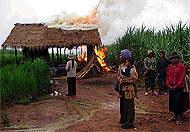Police and Military Burn and Bulldoze Houses During Land Eviction in Cambodia's Northwest
Published on 19 November 2009On October 9, 2009, homes belonging to over 100 families from Bos village in Oddar Meanchey's Konkriel commune, were burned and bulldozed down by a contingent of approximately 150 police, military police, and hired demolition workers. The forced eviction was part of a long standing land dispute between the evicted residents and the Angkor Sugar Company. The Company is owned by Ly Yong Phat, a member of the ruling Cambodian People's Party and a State Senator who claims ownership over the disputed land.
Forestry Administration officials and RCAF troops from Battalion 42 set up roadblocks at the entrances to the village barring human rights workers and the media from entering the village to observe the eviction.
During the eviction, the villagers -- mostly women and children -- sought refuge at a pagoda in neighboring Koktlok village. They carried with them what few possessions they could rescue from their destroyed homes. At the pagoda, provincial officials reportedly tried to force families to thumbprint documents agreeing to their relocation from their land. The proposed relocation site is two kilometers from their current location, but the land lacks basic amenities and is mostly forested. Each family has been promised one hectare of land with no monetary compensation. This is in stark contrast to the five hectares of land each of the families were evicted from.
On the day following the eviction, the families who were staying at the Koktlok pagoda left and re-grouped at public shelters along the roadside. They remain there, where they are monitored by police and military personnel. Their situation is bleak, as most lack basic food supplies, mosquito nets and tarpaulins.
In the days leading up to the eviction, three villagers -- including two community representatives -- were arrested and charged with illegally clearing land and claiming false ownership under the Forestry Law. They are currently being detained in Siem Reap prison. Community representative Huy Chhouy suspects that these people were targeted by the authorities as they were outspoken members of the community. In response to these arrests many of other community activists went into hiding or fled to Phnom Penh fearing arrest. No trial date has been set for the three villagers yet.
Background to Dispute
Bos village was settled on in 1998 by 47 families after the NGO Halo Trust cleared the area of landmines. In 2003, after receiving permission to distribute plots of land from the commune authorities, the population rapidly grew to more than 200 households. Each family received 30m x 60m plot of land for residential purposes and five hectares of farm land.
In 2007, the dispute started when three companies: The Angkor Sugar Company, The Cane and Sugar Valley Company and The Tonle Sugar Cane Company were granted three adjoining economic land concessions, encompassing approximately 6,000 hectares each (19,736 hectares in total) in Konkriel commune. Although the three companies are separate entities with independent management structures, it is suspected that that they are all part of Ly Yong Phat's business conglomerate. Cambodian law limits the maximum size for an economic land concession to 10,000 hectares, however well-connected businesses have been known to circumvent this law by forming multiple corporations and gaining adjoining concessions.
In April 2008, the Angkor Sugar Company became the first company to begin growing sugar cane on the disputed land after demolishing 154 of the villagers' houses. Since then, the remaining residents have been subjected to threats and intimidation aimed at coercing them to accept the relocation terms offered by the companies.
So far 21 families have accepted the relocation package, with each family receiving a 30m by 50m residential plot of land and 1 hectare of farm land.
LICADHO condemns the unlawful forced eviction, the unjustified arrests of community representatives and the use of military police to evict, assault and intimidate civilians, at the behest of companies owned by a CPP senator.
- Topics
- Land Rights Ly Yong Phat








